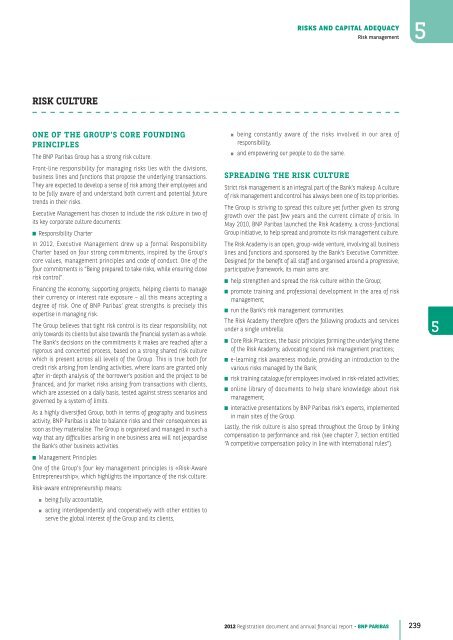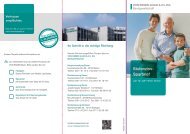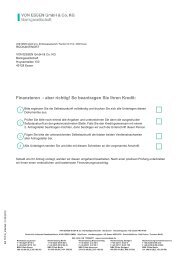- Page 1 and 2:
2012REGISTRATION DOCUMENTAND ANNUAL
- Page 3 and 4:
2012 Registration documentand annua
- Page 5:
1GROUP PRESENTATION1.1 Group presen
- Page 9 and 10:
GROUP PRESENTATIONPresentation of a
- Page 11 and 12:
GROUP PRESENTATIONPresentation of a
- Page 13 and 14:
GROUP PRESENTATIONPresentation of a
- Page 15:
GROUP PRESENTATIONPresentation of a
- Page 18 and 19:
1GROUPPRESENTATIONBNP Paribas and i
- Page 20 and 21:
1GROUPPRESENTATIONBNP Paribas and i
- Page 22 and 23:
1GROUPPRESENTATIONBNP Paribas and i
- Page 24 and 25:
1GROUPPRESENTATIONBNP Paribas and i
- Page 26 and 27:
1GROUPPRESENTATIONBNP Paribas and i
- Page 28 and 29:
1GROUPPRESENTATIONBNP Paribas and i
- Page 30 and 31:
1GROUPPRESENTATION1282012 Registrat
- Page 32 and 33:
2CORPORATEGOVERNANCEBoard of Direct
- Page 34 and 35:
2CORPORATEGOVERNANCEBoard of Direct
- Page 36 and 37:
2CORPORATEGOVERNANCEBoard of Direct
- Page 38 and 39:
2CORPORATEGOVERNANCEBoard of Direct
- Page 40 and 41:
2CORPORATEGOVERNANCEBoard of Direct
- Page 42 and 43:
2CORPORATEGOVERNANCEBoard of Direct
- Page 44 and 45:
2CORPORATEGOVERNANCEBoard of Direct
- Page 46 and 47:
2CORPORATEGOVERNANCEBoard of Direct
- Page 48 and 49:
2CORPORATEGOVERNANCEReport of the C
- Page 50 and 51:
2CORPORATEGOVERNANCEReport of the C
- Page 52 and 53:
2CORPORATEGOVERNANCEReport of the C
- Page 54 and 55:
2CORPORATEGOVERNANCEReport of the C
- Page 56 and 57:
2CORPORATEGOVERNANCEReport of the C
- Page 58 and 59:
2CORPORATEGOVERNANCEReport of the C
- Page 60 and 61:
2CORPORATEGOVERNANCEReport of the C
- Page 62 and 63:
2CORPORATEGOVERNANCEReport of the C
- Page 64 and 65:
2CORPORATEGOVERNANCEReport of the C
- Page 66 and 67:
2CORPORATEGOVERNANCEReport of the C
- Page 68 and 69:
2CORPORATEGOVERNANCEReport of the C
- Page 70 and 71:
2CORPORATEGOVERNANCEReport of the C
- Page 72 and 73:
2CORPORATEGOVERNANCEReport of the C
- Page 74 and 75:
2CORPORATEGOVERNANCEReport of the C
- Page 76 and 77:
2CORPORATEGOVERNANCEExecutive Commi
- Page 78 and 79:
32012REVIEW OF OPERATIONSBNP Pariba
- Page 80 and 81:
32012REVIEW OF OPERATIONSCore busin
- Page 82 and 83:
32012REVIEW OF OPERATIONSCore busin
- Page 84 and 85:
32012REVIEW OF OPERATIONSCore busin
- Page 86 and 87:
32012REVIEW OF OPERATIONSCore busin
- Page 88 and 89:
32012REVIEW OF OPERATIONSCore busin
- Page 90 and 91:
32012REVIEW OF OPERATIONSCore busin
- Page 92 and 93:
32012REVIEW OF OPERATIONSBalance sh
- Page 94 and 95:
32012REVIEW OF OPERATIONSBalance sh
- Page 96 and 97:
32012REVIEW OF OPERATIONSProfit and
- Page 98 and 99:
32012REVIEW OF OPERATIONSProfit and
- Page 100 and 101:
32012REVIEW OF OPERATIONSOutlook3.6
- Page 102 and 103:
32012REVIEW OF OPERATIONSLiquidity
- Page 104 and 105:
4CONSOLIDATEDFINANCIAL STATEMENTS -
- Page 106 and 107:
4CONSOLIDATEDFINANCIAL STATEMENTS -
- Page 108 and 109:
4CONSOLIDATEDFINANCIAL STATEMENTS -
- Page 110 and 111:
4CONSOLIDATEDFINANCIAL STATEMENTS -
- Page 112 and 113:
4CONSOLIDATEDFINANCIAL STATEMENTS -
- Page 114 and 115:
4CONSOLIDATEDFINANCIAL STATEMENTS -
- Page 116 and 117:
4CONSOLIDATEDFINANCIAL STATEMENTS -
- Page 118 and 119:
4CONSOLIDATEDFINANCIAL STATEMENTS -
- Page 120 and 121:
4CONSOLIDATEDFINANCIAL STATEMENTS -
- Page 122 and 123:
4CONSOLIDATEDFINANCIAL STATEMENTS -
- Page 124 and 125:
4CONSOLIDATEDFINANCIAL STATEMENTS -
- Page 126 and 127:
4CONSOLIDATEDFINANCIAL STATEMENTS -
- Page 128 and 129:
4CONSOLIDATEDFINANCIAL STATEMENTS -
- Page 130 and 131:
4CONSOLIDATEDFINANCIAL STATEMENTS -
- Page 132 and 133:
4CONSOLIDATEDFINANCIAL STATEMENTS -
- Page 134 and 135:
4CONSOLIDATEDFINANCIAL STATEMENTS -
- Page 136 and 137:
4CONSOLIDATEDFINANCIAL STATEMENTS -
- Page 138 and 139:
4CONSOLIDATEDFINANCIAL STATEMENTS -
- Page 140 and 141:
4CONSOLIDATEDFINANCIAL STATEMENTS -
- Page 142 and 143:
4CONSOLIDATEDFINANCIAL STATEMENTS -
- Page 144 and 145:
4CONSOLIDATEDFINANCIAL STATEMENTS -
- Page 146 and 147:
4CONSOLIDATEDFINANCIAL STATEMENTS -
- Page 148 and 149:
4CONSOLIDATEDFINANCIAL STATEMENTS -
- Page 150 and 151:
4CONSOLIDATEDFINANCIAL STATEMENTS -
- Page 152 and 153:
4CONSOLIDATEDFINANCIAL STATEMENTS -
- Page 154 and 155:
4CONSOLIDATEDFINANCIAL STATEMENTS -
- Page 156 and 157:
4CONSOLIDATEDFINANCIAL STATEMENTS -
- Page 158 and 159:
4CONSOLIDATEDFINANCIAL STATEMENTS -
- Page 160 and 161:
4CONSOLIDATEDFINANCIAL STATEMENTS -
- Page 162 and 163:
4CONSOLIDATEDFINANCIAL STATEMENTS -
- Page 164 and 165:
4CONSOLIDATEDFINANCIAL STATEMENTS -
- Page 166 and 167:
4CONSOLIDATEDFINANCIAL STATEMENTS -
- Page 168 and 169:
4CONSOLIDATEDFINANCIAL STATEMENTS -
- Page 170 and 171:
4CONSOLIDATEDFINANCIAL STATEMENTS -
- Page 172 and 173:
4CONSOLIDATEDFINANCIAL STATEMENTS -
- Page 174 and 175:
4CONSOLIDATEDFINANCIAL STATEMENTS -
- Page 176 and 177:
4CONSOLIDATEDFINANCIAL STATEMENTS -
- Page 178 and 179:
4CONSOLIDATEDFINANCIAL STATEMENTS -
- Page 180 and 181:
4CONSOLIDATEDFINANCIAL STATEMENTS -
- Page 182 and 183:
4CONSOLIDATEDFINANCIAL STATEMENTS -
- Page 184 and 185:
4CONSOLIDATEDFINANCIAL STATEMENTS -
- Page 186 and 187:
4CONSOLIDATEDFINANCIAL STATEMENTS -
- Page 188 and 189:
4CONSOLIDATEDFINANCIAL STATEMENTS -
- Page 190 and 191: 4CONSOLIDATEDFINANCIAL STATEMENTS -
- Page 192 and 193: 4CONSOLIDATEDFINANCIAL STATEMENTS -
- Page 194 and 195: 4CONSOLIDATEDFINANCIAL STATEMENTS -
- Page 196 and 197: 4CONSOLIDATEDFINANCIAL STATEMENTS -
- Page 198 and 199: 4CONSOLIDATEDFINANCIAL STATEMENTS -
- Page 200 and 201: 4CONSOLIDATEDFINANCIAL STATEMENTS -
- Page 202 and 203: 4CONSOLIDATEDFINANCIAL STATEMENTS -
- Page 204 and 205: 4CONSOLIDATEDFINANCIAL STATEMENTS -
- Page 206 and 207: 4CONSOLIDATEDFINANCIAL STATEMENTS -
- Page 208 and 209: 4CONSOLIDATEDFINANCIAL STATEMENTS -
- Page 210 and 211: 4CONSOLIDATEDFINANCIAL STATEMENTS -
- Page 212 and 213: 4CONSOLIDATEDFINANCIAL STATEMENTS -
- Page 214 and 215: 4CONSOLIDATEDFINANCIAL STATEMENTS -
- Page 216 and 217: 4CONSOLIDATEDFINANCIAL STATEMENTS -
- Page 218 and 219: 4CONSOLIDATEDFINANCIAL STATEMENTS -
- Page 220 and 221: 5RISKSAND CAPITAL ADEQUACY5.6 Count
- Page 222 and 223: 5RISKSAND CAPITAL ADEQUACYAnnual ri
- Page 224 and 225: 5RISKSAND CAPITAL ADEQUACYAnnual ri
- Page 226 and 227: 5RISKSAND CAPITAL ADEQUACYAnnual ri
- Page 228 and 229: 5RISKSAND CAPITAL ADEQUACYAnnual ri
- Page 230 and 231: 5RISKSAND CAPITAL ADEQUACYCapital m
- Page 232 and 233: 5RISKSAND CAPITAL ADEQUACYCapital m
- Page 234 and 235: 5RISKSAND CAPITAL ADEQUACYCapital m
- Page 236 and 237: 5RISKSAND CAPITAL ADEQUACYCapital m
- Page 238 and 239: 5RISKSAND CAPITAL ADEQUACYCapital m
- Page 242 and 243: 5RISKSAND CAPITAL ADEQUACYRisk mana
- Page 244 and 245: 5RISKSAND CAPITAL ADEQUACYRisk mana
- Page 246 and 247: 5RISKSAND CAPITAL ADEQUACYRisk mana
- Page 248 and 249: 5RISKSAND CAPITAL ADEQUACYCredit ri
- Page 250 and 251: 5RISKSAND CAPITAL ADEQUACYCredit ri
- Page 252 and 253: 5RISKSAND CAPITAL ADEQUACYCredit ri
- Page 254 and 255: 5RISKSAND CAPITAL ADEQUACYCredit ri
- Page 256 and 257: 5RISKSAND CAPITAL ADEQUACYCredit ri
- Page 258 and 259: 5RISKSAND CAPITAL ADEQUACYCredit ri
- Page 260 and 261: 5RISKSAND CAPITAL ADEQUACYCredit ri
- Page 262 and 263: 5RISKSAND CAPITAL ADEQUACYCredit ri
- Page 264 and 265: 5RISKSAND CAPITAL ADEQUACYCredit ri
- Page 266 and 267: 5RISKSAND CAPITAL ADEQUACYCredit ri
- Page 268 and 269: 5RISKSAND CAPITAL ADEQUACYCredit ri
- Page 270 and 271: 5RISKSAND CAPITAL ADEQUACYCredit ri
- Page 272 and 273: 5RISKSAND CAPITAL ADEQUACYSecuritis
- Page 274 and 275: 5RISKSAND CAPITAL ADEQUACYSecuritis
- Page 276 and 277: 5RISKSAND CAPITAL ADEQUACYSecuritis
- Page 278 and 279: 5RISKSAND CAPITAL ADEQUACYSecuritis
- Page 280 and 281: 5RISKSAND CAPITAL ADEQUACYSecuritis
- Page 282 and 283: 5RISKSAND CAPITAL ADEQUACYSecuritis
- Page 284 and 285: 5RISKSAND CAPITAL ADEQUACYCounterpa
- Page 286 and 287: 5RISKSAND CAPITAL ADEQUACYCounterpa
- Page 288 and 289: 5RISKSAND CAPITAL ADEQUACYMarket ri
- Page 290 and 291:
5RISKSAND CAPITAL ADEQUACYMarket ri
- Page 292 and 293:
5RISKSAND CAPITAL ADEQUACYMarket ri
- Page 294 and 295:
5RISKSAND CAPITAL ADEQUACYMarket ri
- Page 296 and 297:
5RISKSAND CAPITAL ADEQUACYMarket ri
- Page 298 and 299:
5RISKSAND CAPITAL ADEQUACYMarket ri
- Page 300 and 301:
5RISKSAND CAPITAL ADEQUACYMarket ri
- Page 302 and 303:
5RISKSAND CAPITAL ADEQUACYSovereign
- Page 304 and 305:
5RISKSAND CAPITAL ADEQUACYSovereign
- Page 306 and 307:
5RISKSAND CAPITAL ADEQUACYLiquidity
- Page 308 and 309:
5RISKSAND CAPITAL ADEQUACYLiquidity
- Page 310 and 311:
5RISKSAND CAPITAL ADEQUACYLiquidity
- Page 312 and 313:
5RISKSAND CAPITAL ADEQUACYOperation
- Page 314 and 315:
5RISKSAND CAPITAL ADEQUACYOperation
- Page 316 and 317:
5RISKSAND CAPITAL ADEQUACYOperation
- Page 318 and 319:
5RISKSAND CAPITAL ADEQUACYComplianc
- Page 320 and 321:
5RISKSAND CAPITAL ADEQUACYInsurance
- Page 322 and 323:
5RISKSAND CAPITAL ADEQUACYInsurance
- Page 324 and 325:
5RISKSAND CAPITAL ADEQUACYAppendice
- Page 326 and 327:
5RISKSAND CAPITAL ADEQUACYAppendix
- Page 328 and 329:
5RISKSAND CAPITAL ADEQUACYAppendix
- Page 330 and 331:
5RISKSAND CAPITAL ADEQUACYAppendix
- Page 332 and 333:
5RISKSAND CAPITAL ADEQUACYAppendix
- Page 334 and 335:
5RISKSAND CAPITAL ADEQUACYAppendix
- Page 336 and 337:
6INFORMATIONON THE PARENT COMPANY F
- Page 338 and 339:
6INFORMATIONON THE PARENT COMPANY F
- Page 340 and 341:
6INFORMATIONON THE PARENT COMPANY F
- Page 342 and 343:
6INFORMATIONON THE PARENT COMPANY F
- Page 344 and 345:
6INFORMATIONON THE PARENT COMPANY F
- Page 346 and 347:
6INFORMATIONON THE PARENT COMPANY F
- Page 348 and 349:
6INFORMATIONON THE PARENT COMPANY F
- Page 350 and 351:
6INFORMATIONON THE PARENT COMPANY F
- Page 352 and 353:
6INFORMATIONON THE PARENT COMPANY F
- Page 354 and 355:
6INFORMATIONON THE PARENT COMPANY F
- Page 356 and 357:
6INFORMATIONON THE PARENT COMPANY F
- Page 358 and 359:
6INFORMATIONON THE PARENT COMPANY F
- Page 360 and 361:
6INFORMATIONON THE PARENT COMPANY F
- Page 362 and 363:
6INFORMATIONON THE PARENT COMPANY F
- Page 364 and 365:
6INFORMATIONON THE PARENT COMPANY F
- Page 366 and 367:
6INFORMATIONON THE PARENT COMPANY F
- Page 368 and 369:
6INFORMATIONON THE PARENT COMPANY F
- Page 370 and 371:
6INFORMATIONON THE PARENT COMPANY F
- Page 372 and 373:
6INFORMATIONON THE PARENT COMPANY F
- Page 374 and 375:
6INFORMATIONON THE PARENT COMPANY F
- Page 376 and 377:
6INFORMATIONON THE PARENT COMPANY F
- Page 378 and 379:
7ARESPONSIBLE BANK: INFORMATION ON
- Page 380 and 381:
7ARESPONSIBLE BANK: INFORMATION ON
- Page 382 and 383:
7ARESPONSIBLE BANK: INFORMATION ON
- Page 384 and 385:
7ARESPONSIBLE BANK: INFORMATION ON
- Page 386 and 387:
7ARESPONSIBLE BANK: INFORMATION ON
- Page 388 and 389:
7ARESPONSIBLE BANK: INFORMATION ON
- Page 390 and 391:
7ARESPONSIBLE BANK: INFORMATION ON
- Page 392 and 393:
7ARESPONSIBLE BANK: INFORMATION ON
- Page 394 and 395:
7ARESPONSIBLE BANK: INFORMATION ON
- Page 396 and 397:
7ARESPONSIBLE BANK: INFORMATION ON
- Page 398 and 399:
7ARESPONSIBLE BANK: INFORMATION ON
- Page 400 and 401:
7ARESPONSIBLE BANK: INFORMATION ON
- Page 402 and 403:
7ARESPONSIBLE BANK: INFORMATION ON
- Page 404 and 405:
7ARESPONSIBLE BANK: INFORMATION ON
- Page 406 and 407:
7ARESPONSIBLE BANK: INFORMATION ON
- Page 408 and 409:
7ARESPONSIBLE BANK: INFORMATION ON
- Page 410 and 411:
7ARESPONSIBLE BANK: INFORMATION ON
- Page 412 and 413:
7ARESPONSIBLE BANK: INFORMATION ON
- Page 414 and 415:
7ARESPONSIBLE BANK: INFORMATION ON
- Page 416 and 417:
7ARESPONSIBLE BANK: INFORMATION ON
- Page 418 and 419:
7ARESPONSIBLE BANK: INFORMATION ON
- Page 420 and 421:
7ARESPONSIBLE BANK: INFORMATION ON
- Page 422 and 423:
7ARESPONSIBLE BANK: INFORMATION ON
- Page 424 and 425:
7ARESPONSIBLE BANK: INFORMATION ON
- Page 426 and 427:
7ARESPONSIBLE BANK: INFORMATION ON
- Page 428 and 429:
8GENERALINFORMATIONDocuments on dis
- Page 430 and 431:
8GENERALINFORMATIONFounding documen
- Page 432 and 433:
8GENERALINFORMATIONFounding documen
- Page 434 and 435:
8GENERALINFORMATIONFounding documen
- Page 436 and 437:
8GENERALINFORMATIONStatutory Audito
- Page 438 and 439:
8GENERALINFORMATIONStatutory Audito
- Page 440 and 441:
9STATUTORYAUDITORSStatutory Auditor
- Page 442 and 443:
10PERSON RESPONSIBLE FOR THE REGIST
- Page 444 and 445:
11TABLE OF CONCORDANCEHeadings as l
- Page 448:
HEAD OFFICE16, boulevard des Italie





